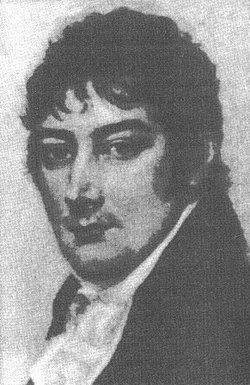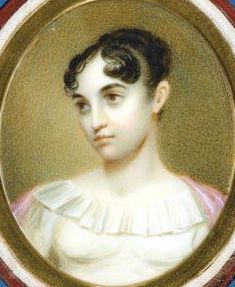Governor Joseph Alston’s Record in the War of 1812
July 13, 2014 in American History, general history

Joseph Alston was born in 1779 to a wealthy family in South Carolina. He attended the College of New Jersey, which was later renamed Princeton, but he never graduated. He studied law and was admitted to the bar, but he never practiced. He was a planter by trade and one of the wealthiest men in South Carolina.
Joseph Alston also had political ambitions. In furtherance of same, he married Theodosia Burr, the daughter of Aaron Burr in 1801. He was a member of the Democratic-Republican party, the same one that Thomas Jefferson and Aaron Burr belonged to. The marriage to Theodosia Burr took place on the eve of the resolution of the complicated election that would catapult Jefferson to the presidency and made Aaron Burr vice president. It was during a period of time when Burr’s fortune was on the rise, and prior to the duel with Hamilton and the the falling out with Jefferson that eventually snuffed out Burr’s career prematurely
The marriage to Theodosia, together with his status as a wealthy landowner and businessman, enabled Alston to win elective office. He served in the South Carolina House of Representatives from November 20, 1805 to December 10, 1812. He was a speaker of the house from 1809 to 1812, and he was chosen to be Governor of South Carolina beginning December 1 of 1812.
Joseph Alston’s wealth came primarily from rice plantations, and the labor on which his business depended was by and large slave labor. Because of the warm weather and the humidity, and because the rice paddies harbored many mosquitoes, malaria was a disease to contend with. At the time, the causes of malaria were not known, but successful planters knew that the best laborers — and the ones most likely to survive the swamps — were those imported from the Senegambia region in West Africa where they were already likely to have survived a childhood bout of malaria. For males between the ages of fourteen and eighteen they paid, in today’s money , between $11,000 and $23,000. With such an investment on the line, they wanted slaves who were likely to survive the difficult conditions.
While on average two in three West African children fell victim to malaria and died, those who survived to the age of fourteen were immune to the disease. On the other hand, the white population of South Carolina did not undergo the serious trials of their black counterparts and largely avoided exposure to malaria by going up into the mountains or leaving on some other vacation during the summer months. When Aaron Burr first gave his consent to the marriage of his daughter to Joseph Alston, the plan was that she would spend her summers up North with her father. But Burr fell on hard times, went into exile, and had only just returned to New York a ruined man in 1812.
In June of 1812, the Alstons were not able to go elsewhere to avoid exposure to malaria. War had just been declared against Great Britain. Joseph Alston had duties in the state militia. He had to stay where he was, and so did his wife, and their ten year old son, Aaron Burr Alston, was exposed to and died of malaria. Alston’s grieving wife, Theodosia, boarded the Patriot on December 31, 1812 for a trip to New York to see her father and disappeared into the mists of time. But Alston’s troubles were only just beginning.
When he tried to muster the militia to prepare for war, he encountered unexpected resistance. The problem was not that the men refused to serve against the British. The enemy they most feared was malaria. Many openly disobeyed orders, refused to serve, and when the Governor attempted to have the ringleaders tried for desertion, the court found in favor of the accused. A contemporary account of the court’s reasoning can be found in John Belton O’Neal’s Biographcal Sketches of Bench and Bar:
I knew Mr. Stark well, and had much to do with him as Solicitor; and I have no hesitation in saying, that the objection, which was urged against him, that he was ” too severe” was altogether untrue. He was a firm, just man, in the discharge of his duty; but there was no one who sooner yielded to the just claims of mercy than he did. In 1814, Mr. Stark and myself defended Colonel Starling Tucker, before the Court Martial ordered to try him, on charges preferred against him by the Commander-in-chief, Governor Allston, in relation to the service of the first class of the militia, ordered into service from the brigade, then ranked as the second, now the tenth. (Biographical Sketched of Bench and Bar, p. 68)
.The chief reason that was given in mitigation of harsh sentence was that the men required to serve were “unaccustomed to the climate.”
Immediately after the regiment encamped, a council of all the officers of the line assembled, to consult as to what should be done, as to the detailed order to throw up the tête du pont, and they unanimously advised that it should be disobeyed; and everyone from the highest to the lowest so pledged themselves. This was not only disobedience, but mutiny, and might have been visited by serious consequences; but there was a great palliation in the excited state of the men’s minds, and their belief that the duty to be done under a stern disciplinarian, and would probably be at the sacrifice of many lives, who were unaccustomed to the climate. (James Holdridge, John Belton O’Neal, sources.)
That South Carolina freemen were unaccustomed to the climate of South Carolina, though many had been born and bred there, whereas the imported slaves on the plantations in the area were accustomed to the climate, is one of the many ironies of the situation.
Alston was so incensed at having his orders countermanded and the courts siding with the deserters, that he decided to disband the militia altogether and sent everyone home. However, when a British force landed on St. Helena Island, and the coast of South Carolina was all undefended, he was forced to reverse himself. He returned to the state legislature and asked for and was granted greater war powers for mustering the state militia. But the British could not have been more immune to malaria than the Americans, so they do not appear to have stayed on St. Helena Island for long. There appears to be no record of an engagement with the enemy there.
Although the cause of malaria and effective treatments for it were not known at the time, the South Carolina planters and other free whites in peacetime found ways to protect themselves and reduce their children’s exposure to the disease, while the slaves on their plantations could not. This resulted in higher infant mortality among the slaves, but those who survived to adulthood had genetic immunity that they could even pass on to their children, while a whole generation of military age free men did not. Yet the slaves could not serve in the military unless they were first freed, and the freemen could not serve effectively without exposing themselves to the deadly disease.
As for Joseph Alston, his service as governor ended on December 1, 1814. He was not well for the remainder of his life, possibly suffering himself from symptoms of malaria. He died on September 19, 1816. Today he is remembered chiefly for the fact that he had once been married to Theodosia Burr.
References
The African Slave Trade and South Carolina
African-American Heritage and Ethnography
Biographical Sketches of Bench and Bar — online
John Belton O’Neal, Biographical Sketches of the Bar and Bench of South Carolina, II:69-73
Members of the 19th General Assembly — South Carolina







Recent Comments